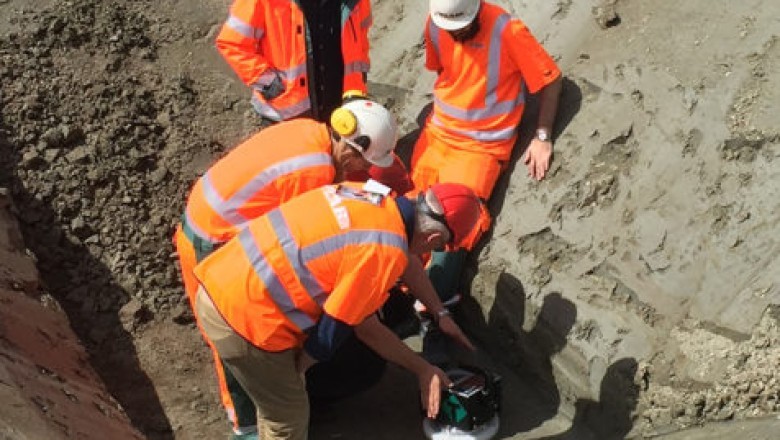views
Improving Asphalt Quality: Key Asphalt Lab Device and Techniques
Asphalt testing is crucial for quality control and enhanced road construction. Therefore, proper testing and density measurement of asphalt mixtures requires lab equipment. This indicates whether the material meets set standards.
Among the essentials for any lab are a non-nuclear density gauge, weighing balances, and several other pieces of equipment. This blog gives an insight into how these tools are used and their significance in ensuring asphalt quality control.
Why Is It Crucial to Maintain the Asphalt Quality?
Asphalt quality control affects the durability of roads, runways, bridges, and other high-traffic constructions. The proper density of the asphalt is also important. When the density is incorrect, problems often result, including cracking, rutting, and early pavement degradation. For contractors and engineers, it warrants quality control in construction.
Advantages of Using Proper Techniques and Equipment in Controlling Asphalt Quality
This is evidence that asphalt quality control is crucial in providing long service of roads and runways. High-tech instruments for testing, including non-nuclear density gauges and a precise weighing balance, have significantly boosted quality assurance. Here are the key benefits of integrating modern tools into asphalt testing:
- Improved Accuracy in Critical Projects
Modern tools always give highly accurate results. This accuracy is vital in projects that need to determine safety or the long-term nature of the project. The equipment ensures the reliability of mass and density measurements.
- Increased Safety
Advanced asphalt testing tools enhance safety because they can help the asphalt mix meet regulatory standards. Modern equipment like a non-nuclear density gauge does not contain radioactive sources, which minimizes safety issues and ensures convenience for quality management.
- Streamlined Testing Process
Non-nuclear gauges do not have regulation paperwork associated with nuclear devices, making testing easy. This results in even faster approval times and more paperwork off the desks. Plus, it allows them to execute their primary testing tasks.
- Greater Accuracy of Measurements
The weighing balance allows one to check even the slightest difference within a sample continuously. It is important to ensure precise density calculations. This enables technicians to note any irregularities within the asphalt mix, resulting in better results and a more sustainable mix.
- Less Testing Time and Improved Efficiency
Modern asphalt testing tools speed up testing, helping technicians receive accurate results immediately. Shorter testing times lead to project continuation, helping contractors avoid delays and expensive project slowdowns.
- Cost-Effective Quality Control
The asphalt lab equipment tool streamlines the testing procedure and ensures fast turnaround times, making a project cheaper. Contractors can ensure quality output without having to spend a lot of money.
- Ensure Compliance with Standards
The asphalt testing tools also assist professionals in ensuring that all the measurements taken will conform to the specific standards in the construction business. This helps the contractors deliver quality work and avoid costly repairs in the future.
Steps for Accurate Asphalt Quality Control
With the right tools in place, there are specific steps that technicians should follow. This helps them achieve accurate results in asphalt quality control:
Step 1: Sample Preparation
Sample preparation is an important aspect of testing, especially to get the right results. A number of technicians perform density tests and compaction moulds, which they use to dry the asphalt mix. This step ensures proper compacting and drying of the sample, ensuring no density limits.
Step 2: Density Testing with Non-Nuclear Density Gauge
After samples are checked, density measurements are made using a non-nuclear density gauge. The gauge is applied to the sample, and the result is displayed in digital format. This gauge is particularly useful as it affords several readings rapidly without any risk.
Step 3: Weighing and Moisture Testing
When the density is least constant, the weighing balance is used to determine the mass of the sample. To get a more detailed analysis, technicians perform further testing, like moisture testing, because moisture pulls the density of the asphalt. This ensures accurate measurements to get the correct density.
Step 4: Data Analysis
After all the testing, experts must analyze the data to determine whether the sample has relative density and composition. They must measure the density at certain interval distances. Plus, the experts must check any inconsistency, such as an outlier, that can cause suspicion. This way, they can again run the tests or make changes to get that correct asphalt mix.
Conclusion
Every contractor and technician in the asphalt industry needs a quality control laboratory with modern asphalt lab equipment. The laboratories should employ non-nuclear density gauges and weighing balances to measure the asphalt mx properly.
Testing ensures higher efficiency and quality asphalt for construction. This results in longer-lasting, safer roads and timely project execution. Investing in quality asphalt testing tools in a growing construction environment makes great strategic sense. Choose us for the best assistance.






















Comments
0 comment